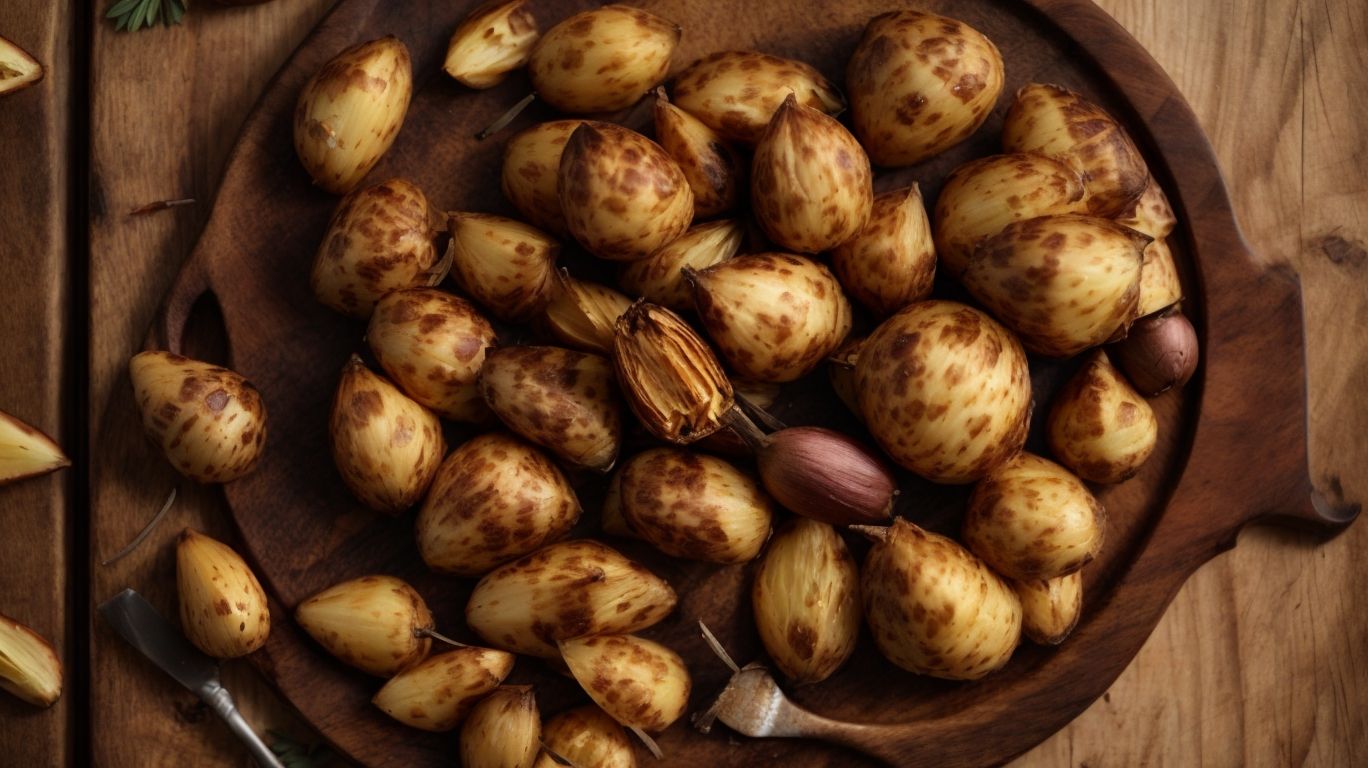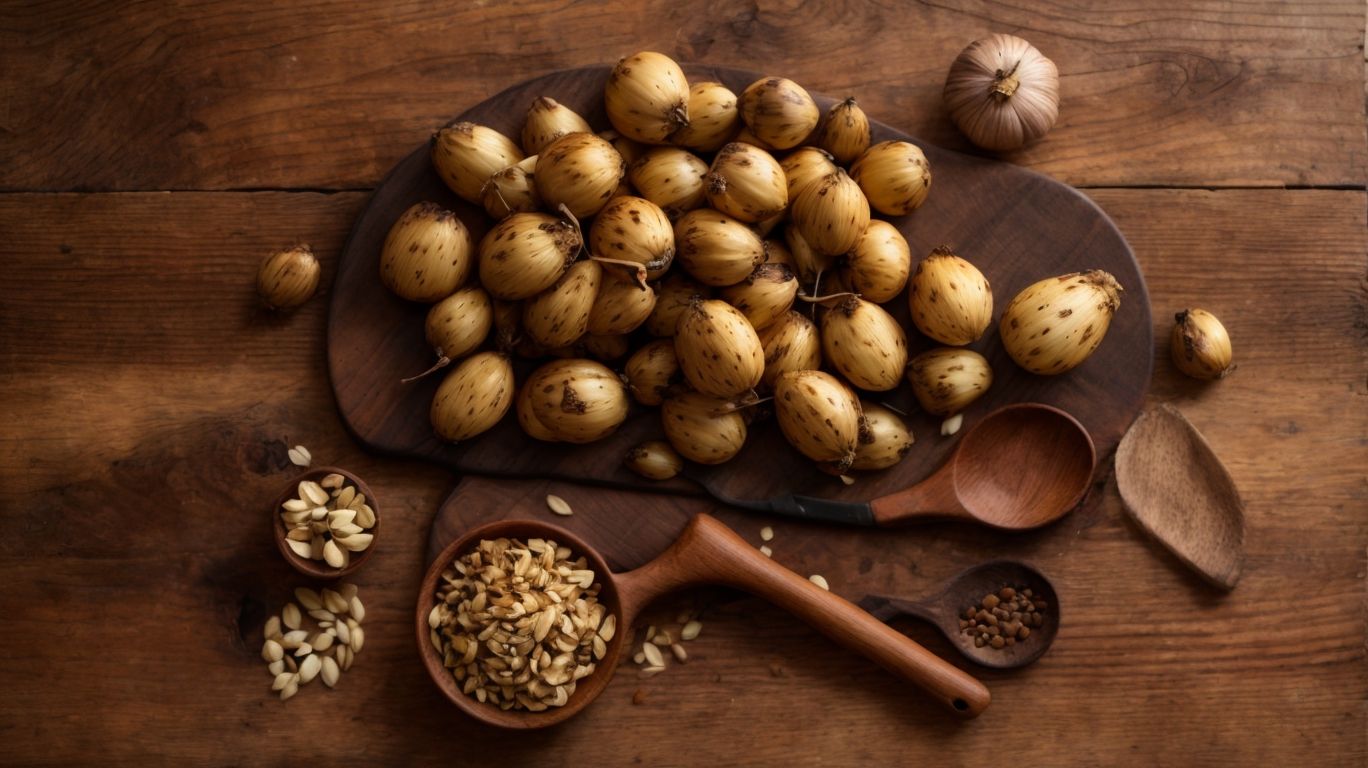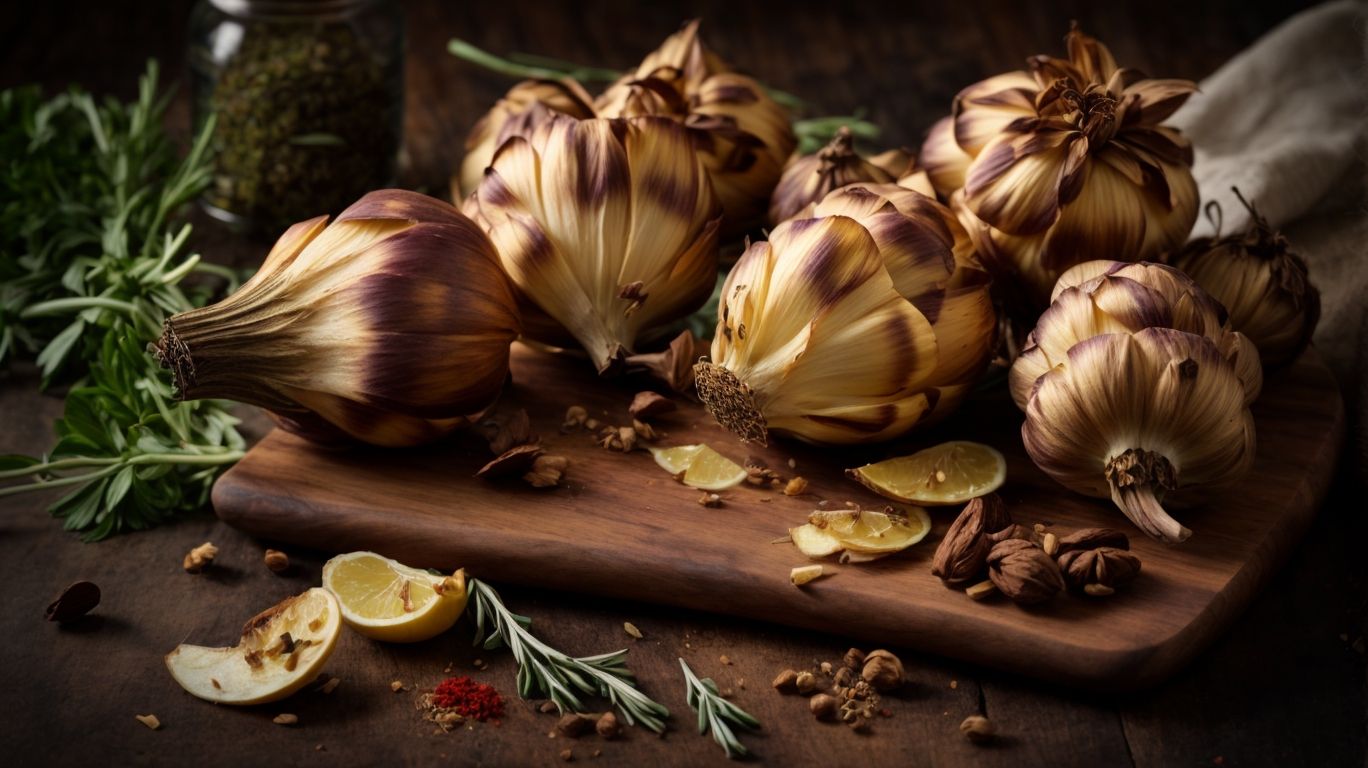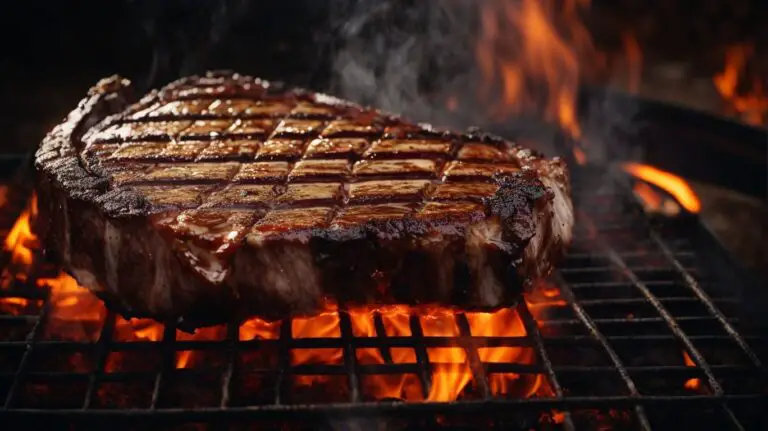How to Cook Jerusalem Artichokes?
Curious about Jerusalem artichokes but not sure where to start?
In this article, we’ll explore everything you need to know about these unique vegetables – from what they taste like to where to find them, how to select the best ones, and the best ways to store them.
We’ll also delve into various cooking methods and share delicious recipes to help you make the most of this versatile ingredient.
If you’re ready to elevate your culinary skills and impress your taste buds, keep reading!
Key Takeaways:
What are Jerusalem Artichokes?
Jerusalem artichokes, also known as sunchokes, are root vegetables that belong to the sunflower family.
These tubers are characterized by their knobby, thin skin and creamy-white flesh, offering a sweet, nutty flavor reminiscent of artichokes – hence the name. Despite their name, they are not related to artichokes but are actually a species of sunflower. When cooked, Jerusalem artichokes develop a soft, velvety texture, making them perfect for soups, stews, and roasting. This versatile vegetable can be enjoyed boiled, mashed, or even pickled, adding a unique twist to various dishes.
What do Jerusalem Artichokes Taste Like?
Jerusalem artichokes have a unique taste profile, characterized by nutty and slightly sweet flavors.
These distinctive tubers offer a delightful combination of earthy notes with hints of sweetness that make them a versatile ingredient in various dishes.
When roasted, Jerusalem artichokes develop a rich, caramelized flavor that enhances their natural sweetness while maintaining a pleasant nuttiness. This makes them a delicious addition to salads or purees.
Their nutty undertones pair well with savory elements like garlic, thyme, and Parmesan, creating a complex and satisfying taste profile.
Where to Find Jerusalem Artichokes?
Jerusalem artichokes are commonly available in supermarkets and specialty stores, especially in regions like Italy.
How to Select the Best Jerusalem Artichokes?
When selecting Jerusalem artichokes, look for firm and unblemished ones, as recommended by renowned chef Camille.
How to Store Jerusalem Artichokes?
Proper storage is essential for Jerusalem artichokes to maintain their freshness and quality over time.
What is the Best Way to Keep Them Fresh?
To keep Jerusalem artichokes fresh, store them in a cool, dark place with good ventilation.
Jerusalem artichokes are best stored in a location with consistent airflow to prevent moisture buildup, which can lead to quick spoilage. A pantry or cellar works well as long as it is not damp or too warm. Avoid storing them in plastic bags or containers as they need to breathe.
Additionally, keeping Jerusalem artichokes away from light is crucial to maintain their freshness and prevent them from sprouting prematurely. Remember, these root vegetables will last longer if kept in ideal conditions, making them readily available whenever you are ready to use them in culinary dishes.
How Long Can They Be Stored?
Jerusalem artichokes can be stored for up to two weeks if kept in optimal conditions.
Proper storage is key to maximizing the shelf life of Jerusalem artichokes. To maintain their freshness, store them in a cool, dark place with good ventilation. Avoid exposing them to moisture or sunlight, as this can lead to spoilage.
Regularly check for any signs of sprouting or mold, as these are indicators that the tubers are starting to deteriorate. Consider storing them in a mesh bag or container that allows for air circulation, preventing them from becoming soggy. By following these storage guidelines, you can ensure that your Jerusalem artichokes remain flavorful and crisp for the full two weeks.
Preparing Jerusalem Artichokes for Cooking

Credits: Poormet.Com – Eric Young
Before cooking, Jerusalem artichokes need to be cleaned, peeled, and sometimes soaked to enhance their texture and taste.
How to Clean and Peel Jerusalem Artichokes?
Cleaning and peeling Jerusalem artichokes involves scrubbing them thoroughly to remove dirt and outer skin for a clean preparation.
Start by rinsing the Jerusalem artichokes under cold water to remove any visible dirt or debris. Using a vegetable brush, gently scrub the skin to ensure all dirt is removed.
Next, trim the ends of the artichokes to create a flat surface for stability. With a vegetable peeler, carefully peel off the skin, making sure to remove all the rough patches. This process not only enhances the visual appeal of the dish but also eliminates any bitterness that may come from the skin.
Should You Soak Them in Water Before Cooking?
Soaking Jerusalem artichokes in water before cooking can help reduce their earthy taste and improve their overall texture.
Allowing the Jerusalem artichokes to soak for at least 30 minutes or up to a few hours can make a significant difference in the final dish. This process not only helps to soften the tough outer skin but also aids in breaking down indigestible sugars, leading to better digestibility. The water helps to mellow out the slight nuttiness and enhance the natural sweetness of Jerusalem artichokes, resulting in a more balanced flavor profile. Soaking can help retain moisture during cooking, keeping the flesh tender and preventing it from becoming too dry.
Cooking Methods for Jerusalem Artichokes

Credits: Poormet.Com – Samuel Davis
Jerusalem artichokes can be prepared using various cooking methods such as roasting, boiling, frying, grilling, and steaming to bring out their unique flavors.
Roasting
Roasting Jerusalem artichokes with olive oil and garlic yields a delicious dish with crispy edges and tender insides.
To start the process, preheat the oven to 400°F. Wash and scrub the Jerusalem artichokes to remove any dirt, then slice them into even-sized pieces. Place the artichoke slices on a baking sheet, drizzle generously with olive oil, ensuring each piece is coated. Next, mince fresh garlic and sprinkle it over the artichokes. Mix everything together gently to evenly distribute the flavors. Spread the seasoned artichokes in a single layer on the baking sheet to promote even cooking. Roast the artichokes for about 30-40 minutes, flipping them halfway through, until they turn golden brown and develop crispy exteriors. Enjoy these flavorful, crispy Jerusalem artichokes as a delightful side dish or snack!
Boiling
Boiling Jerusalem artichokes is a common technique used in preparing soups, gratins, and other dishes that require a soft texture.
When boiling Jerusalem artichokes for soups or gratins, it’s crucial to start with fresh, firm tubers to ensure a delicious end result. To achieve the perfect softness, peel and dice the Jerusalem artichokes into uniform pieces for even cooking. Place them in a pot of cold, salted water and bring it to a gentle boil. Cover with a lid and simmer until the artichokes are fork-tender, usually around 15-20 minutes.
Remember not to overcook them as they can turn mushy. Once done, drain the artichokes and incorporate them into your desired soup or gratin recipe to enjoy their unique nutty flavor.
Frying
Frying Jerusalem artichokes in miso butter creates a crispy and flavorful dish that can be enjoyed as a side or appetizer.
To achieve that perfect crispiness when sautéing Jerusalem artichokes in miso butter, it’s essential to start with a hot pan and clarified butter to prevent burning. Begin by slicing the artichokes evenly to ensure they cook uniformly. Place them in the pan with the miso butter, allowing them to sear until golden brown on each side. The miso butter adds a rich umami flavor, complementing the natural nuttiness of the Jerusalem artichokes. This cooking method truly enhances the unique taste and texture of this underrated vegetable.
Grilling
Grilling Jerusalem artichokes with lemon and parmesan adds a zesty touch to their natural flavors, making them a delightful barbecue option.
When preparing this dish, start by cleaning the Jerusalem artichokes thoroughly to remove any dirt or residue. Slice them lengthwise into manageable pieces for grilling. The lemon juice will impart a refreshing tanginess to complement the earthy notes of the artichokes, while the grated parmesan cheese adds a savory depth with its nutty undertones. As the artichokes cook on the grill, the flavors meld together, creating a mouthwatering aroma that will entice your guests. Serve these grilled delights as a side dish or even as a vegetarian main course at your next barbecue gathering.
Steaming
Steaming Jerusalem artichokes is ideal for creating creamy purees or incorporating them into risottos for a velvety texture and rich taste.
When steaming Jerusalem artichokes, the process helps to lock in their natural flavors and nutrients, making them a versatile ingredient for a variety of dishes. To make a smooth and silky puree, simply steam the Jerusalem artichokes until they are tender, then blend them until they reach the desired consistency. In risottos, adding steamed Jerusalem artichokes brings a subtle nutty flavor and a velvety texture that complements the creaminess of the dish perfectly. Steamed Jerusalem artichokes add a unique depth of flavor and a hint of sweetness to any recipe they are included in.
Delicious Recipes with Jerusalem Artichokes
Experiment with Jerusalem artichokes in dishes like soup, chips, risotto, and salads to explore their culinary versatility.
Jerusalem Artichoke Soup
Jerusalem artichoke soup is a creamy and comforting dish made with simple ingredients and easy instructions.
If you are looking to prepare a delightful bowl of Jerusalem artichoke soup, start by gathering the necessary ingredients such as Jerusalem artichokes, onions, garlic, vegetable broth, heavy cream, butter, salt, and pepper.
Begin the cooking process by sautéing the onions and garlic in butter until they turn tender. Add chopped Jerusalem artichokes and vegetable broth to the pot, then let it simmer until the artichokes are soft.
Once everything is cooked through, blend the mixture until it reaches a smooth and creamy consistency. Stir in some heavy cream and season with salt and pepper to taste.
Serve the soup hot, garnished with a sprinkle of fresh herbs for an extra touch of flavor.
Roasted Jerusalem Artichokes with Garlic and Herbs
Roasted Jerusalem artichokes with garlic and herbs offer a flavorful and aromatic dish prepared by baking them to perfection.
To achieve the best results, start by thoroughly washing and scrubbing the Jerusalem artichokes to remove any dirt. Then, cut them into evenly sized pieces to ensure they cook uniformly. Place the prepared artichokes in a large bowl and drizzle generously with olive oil, ensuring each piece is well coated. Next, add minced garlic, freshly chopped herbs like rosemary and thyme, and a sprinkle of salt and pepper for seasoning. Toss everything together gently to distribute the flavors.
Jerusalem Artichoke Chips
Jerusalem artichoke chips are a crunchy and savory snack seasoned with black pepper and garlic powder for added zest.
If you crave a satisfyingly crispy bite to munch on, look no further than these delectable Jerusalem artichoke chips. These chips boast a delightful texture that is both crunchy and light, making them the perfect snack for any occasion. To achieve the utmost crispiness, thinly slice the Jerusalem artichokes into rounds. After seasoning them generously with the flavorful combination of black pepper and garlic powder, pop them into the oven until they turn golden brown and irresistibly crunchy. Be prepared to be amazed by the explosion of flavors and textures in every bite!
Grilled Jerusalem Artichokes with Lemon and Parmesan
Grilled Jerusalem artichokes with lemon and parmesan are a delectable dish that turns fork-tender on the grill, infused with citrusy and cheesy flavors.
To achieve the perfect tenderness of these artichokes, start by prepping them – scrub the Jerusalem artichokes clean under running water and pat them dry. Next, cut them into even-sized chunks or slices, depending on your preference. Preheat the grill to medium-high heat. In a bowl, toss the artichokes with olive oil, lemon juice, salt, and pepper.
Place the seasoned Jerusalem artichokes on the grill, ensuring they are in a single layer to allow for even cooking. Grill for about 10-15 minutes, turning occasionally, until they are golden brown and tender. The parmesan can be sprinkled over the artichokes during the last few minutes of grilling to melt and add a rich, cheesy layer of flavor.
Jerusalem Artichoke and Mushroom Risotto
Jerusalem artichoke and mushroom risotto is a creamy and indulgent dish that combines the earthy flavors of both ingredients in a comforting meal.
Risotto, a traditional Italian dish, gets elevated to a whole new level with the addition of Jerusalem artichokes and mushrooms. The key to achieving that signature creamy texture lies in the gradual addition of hot broth and constant stirring, coaxing out the starch from the rice grains. As the rice cooks and absorbs the flavorful liquid, the mushrooms release their umami essence, melding beautifully with the nutty undertones of the Jerusalem artichokes. Each spoonful offers a rich and satisfying experience that is both simple and luxurious.
Frequently Asked Questions
How to Cook Jerusalem Artichokes?
There are several delicious ways to cook Jerusalem artichokes, also known as sunchokes. Here are some simple, go-to methods:
Do I need to peel Jerusalem artichokes before cooking?
Jerusalem artichokes have a thin skin that is edible, so you can leave the skins on if you wish. However, if you prefer a smoother texture, you can peel them before cooking.
Can I roast Jerusalem artichokes?
Absolutely! Roasting is a great way to bring out the nutty, earthy flavor of Jerusalem artichokes. Simply toss them with some oil and your favorite seasonings, and roast at 400 degrees Fahrenheit for 20-25 minutes.
How do I prepare Jerusalem artichokes for cooking?
Before cooking, make sure to thoroughly scrub the Jerusalem artichokes under running water to remove any dirt or debris. If you have opted to peel them, use a vegetable peeler to remove the skin.
Can I eat Jerusalem artichokes raw?
Yes, Jerusalem artichokes can be eaten raw! They have a crisp, crunchy texture and a slightly sweet taste. They can be sliced and added to salads or used as a dipper for hummus or other dips.
Can I substitute Jerusalem artichokes for other vegetables in recipes?
Absolutely! Jerusalem artichokes can be used in place of potatoes, parsnips, or other root vegetables in many recipes. They add a unique flavor and texture to dishes.







